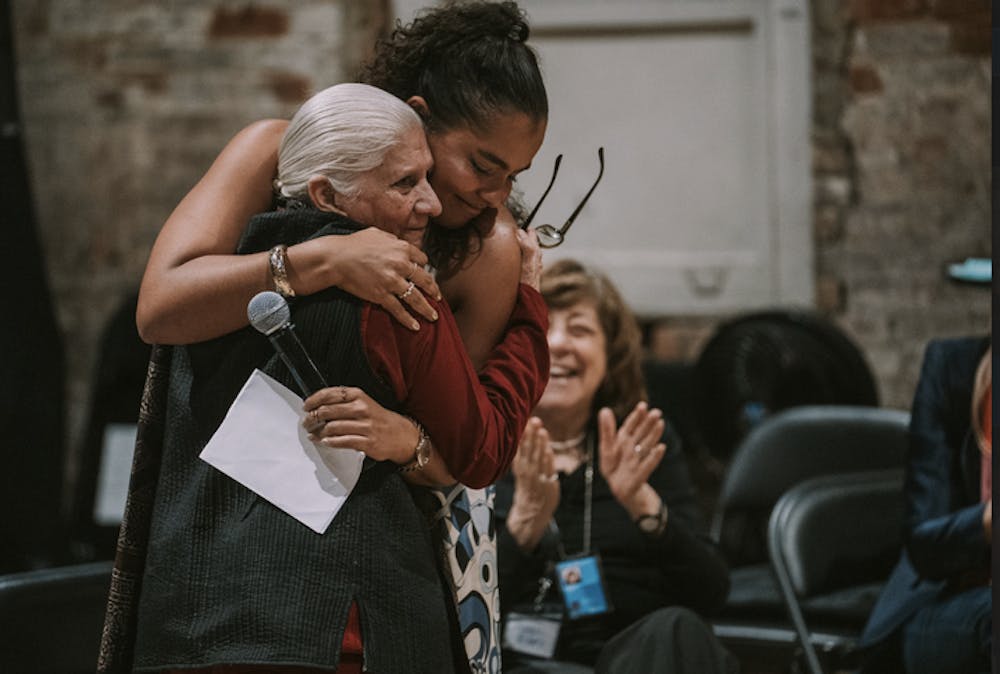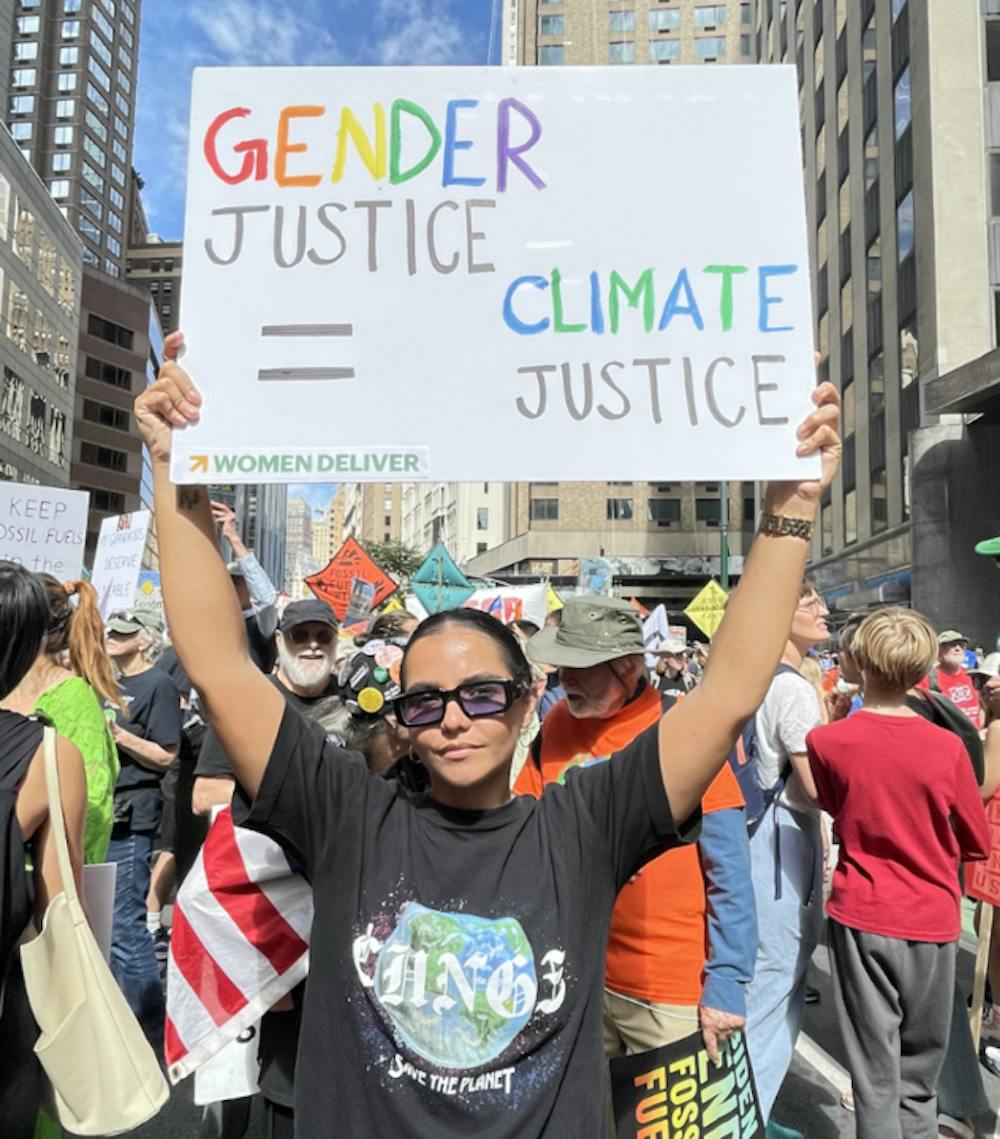Growing up in Rabat, Morocco, Yasmina Benslimane witnessed the strength and resilience of the women around her. Women who toiled in the fields with bare hands, walked miles to fetch clean water and endured forced marriages leading to lives of domestic servitude. These scenes, both inspiring and unsettling, left a lasting impact on Benslimane.
"Seeing all of these injustices ignited a fire within, and that's when I started learning about feminism," Benslimane said.
This “fire within” would ignite change that continues to influence communities around the world.
On Monday, April 14, at 7 p.m. the University of Portland will welcome young feminist champion Yasmina Benslimane on Zoom from the Dundon-Berchtold Auditorium for the 2025 Mazzocco Lecture.
The Department of Political Science and Global Affairs sponsored event is expected to touch on transnational solidarity, collective feminist struggles and the fight for global liberation. Students will be encouraged to ask questions in the auditorium for Benslimane to answer on Zoom.
Benslimane's accolades speak for themselves: She has been recognized by Forbes 30 Under 30. She was named one of BBC's 100 Most Influential and Inspiring Women. She founded Politics4Her and has laid the foundation for numerous other feminist organizations that advocate for millions of young girls and women internationally. Despite her rise to the heights of activism and influence, Benslimane remains unapologetically authentic.
Assistant Professor of Political Science and Global Affairs Lara-Zuzan Golesorkhi, who like Benslimane has spoken at the United Nations about her own activism, considers Benslimane a close friend who never fails to impress her both in a professional and personal way.
"Her whole heart and soul is in [her work]…she is so, so real," Golesorkhi said.
Benslimane grew up around women whom she credits for making her the person she is today. She was raised by a single mother in Morocco at a time when the country was governed by patriarchal laws and leadership. In her mother, Benslimane saw a strong woman capable of anything. She found this to be a common trait of women in her community that inspired her journey towards embracing feminism.
"Observing those women in my everyday life really inspired me to step into my power, and that it wouldn't be because of my gender that I wouldn't be able to achieve anything I put my mind to," Benslimane said.

Benslimane embraces an individual at a speaking engagement. Photo courtesy of Monica Anindwitya.
Golesorkhi first connected with Benslimane over social media, where they discussed initiatives and programs that they were a part of. The first time Golesorkhi met Benslimane in person was in 2022 during the United Nations International Migration Review Forum.
"I do remember running into her in one of the hallways very briefly," Golesorkhi said. "And I'm like, 'That is her! That is the person I've been following on social media.’ I did a double take. She's phenomenal. I thought, 'Maybe I should say hi.’"
For Golesorkhi, Benslimane’s words aren’t just heard, they’re felt.
"When she speaks, it touches me, and it moves me, and it does so in a way where it's genuine and where it shakes me to the core," Golesorkhi said.
Indeed, Benslimane’s work has had a tremendous impact across many communities worldwide. The activist has contributed to organizations dedicated to strengthening the impact of women on various industries.
Many of her organizations are created out of Benslimane's commitment to addressing the needs she sees in communities.
One need that Benslimane observed involved argan oil, a popular Moroccan resource that she says has been subject to misleading promotional practices abroad.
"When I came to the US, I started seeing a lot of argan oil 'from Morocco,' but it's not from Morocco; it's made by a Western company,” Benslimane said. “Why are they using our name to make millions? That's wrong. The women that are actually making argan oil experience such a lengthy and consuming process that takes days.”
To combat this issue, she founded Climate Sirens, a global initiative that works with women's cooperatives in North Africa and Southwest Asia to create sustainable beauty products and support women's economic empowerment.
Benslimane has also launched a tech startup in Puerto Rico to provide mentorship and skill-building opportunities to women in the region.
"We've seen it, too, with this new administration — Elon Musk and the OpenAI CEO and all of the tech giants are led by men,” Benslimane said. “So we're trying to build the platform for women here that either are in tech or want to transition towards that."
Benslimane will be the first to admit that the road to change has not been easy. She acknowledges facing significant obstacles in her advocacy work.
"Whether it's being intimidated, harassed by diplomats physically or verbally,” Benslimane said. “I've seen it all.”
Benslimane chuckles a little as she recalls moments where her “loud voice” has gotten her “in a lot of trouble.”
One such moment came in response to her frustrations at various organizations for refusing to compensate young women of color for their work. Benslimane took to LinkedIn with #NoPaymentNoYasmina, and the post quickly led other activists to adopt the same phrase, replacing ‘Yasmina’ with their own names to demand similar change, including Golesorkhi.
“This is so funny, because a lot of people started telling me, ‘I also started embracing #NoPaymentNo [their name],’ even [Golesorkhi]!” Benslimane said. “I started the revolution, low-key!”
Perhaps the most remarkable feature of her commitment to justice and equality is how much she has accomplished in such a short time. At just 31, Benslimane has already changed the lives of millions of girls and women around the world, and she has no intention of stopping.

Benslimane poses for a photo at a protest. Photo courtesy of Monica Anindwitya.
When asked about the future of her work, Benslimane quoted civil rights activist Audre Lorde.
"I am not free until every woman is free, even if her shackles are different from my own,” Benslimane said.
Golesorki also commented on Benslimane's relentless pursuit of justice.
"She just keeps going and going because she sees that there's a need,” Golesorki said. “She's always everywhere at all times."
Benslimane stresses the importance of interconnectedness, and says that all areas of her work are intertwined.
"Everything is feminist, to be honest…,” Benslimane said. “It's about liberation in a world that is truly interconnected in every intimate aspect of it, but that we might not see until we start digging and using critical thinking and applying an intersectional lens to everything that we work on.”
Benslimane’s message of liberation comes at a critical time in America as the Trump Administration poses new risks to feminism worldwide. The administration has undercut civil rights enforcement across federal agencies, erased vital health information from public websites and eliminated the Gender Policy Council, with new threats and executive orders issued often.
Despite all of the fear and uncertainty in the world, Benslimane offers words of encouragement. She aims to remind everyone that no matter who sits in positions of power, it is the citizens of the world who can truly make a difference.
"It's always been power to the people," Benslimane said. "You have way more power than you think."
Rieve Randall is a News Reporter for The Beacon. He can be reached at randallr28@up.edu.
Maggie Dapp is the Sports Editor at The Beacon. She can be reached at dapp26@up.edu.








